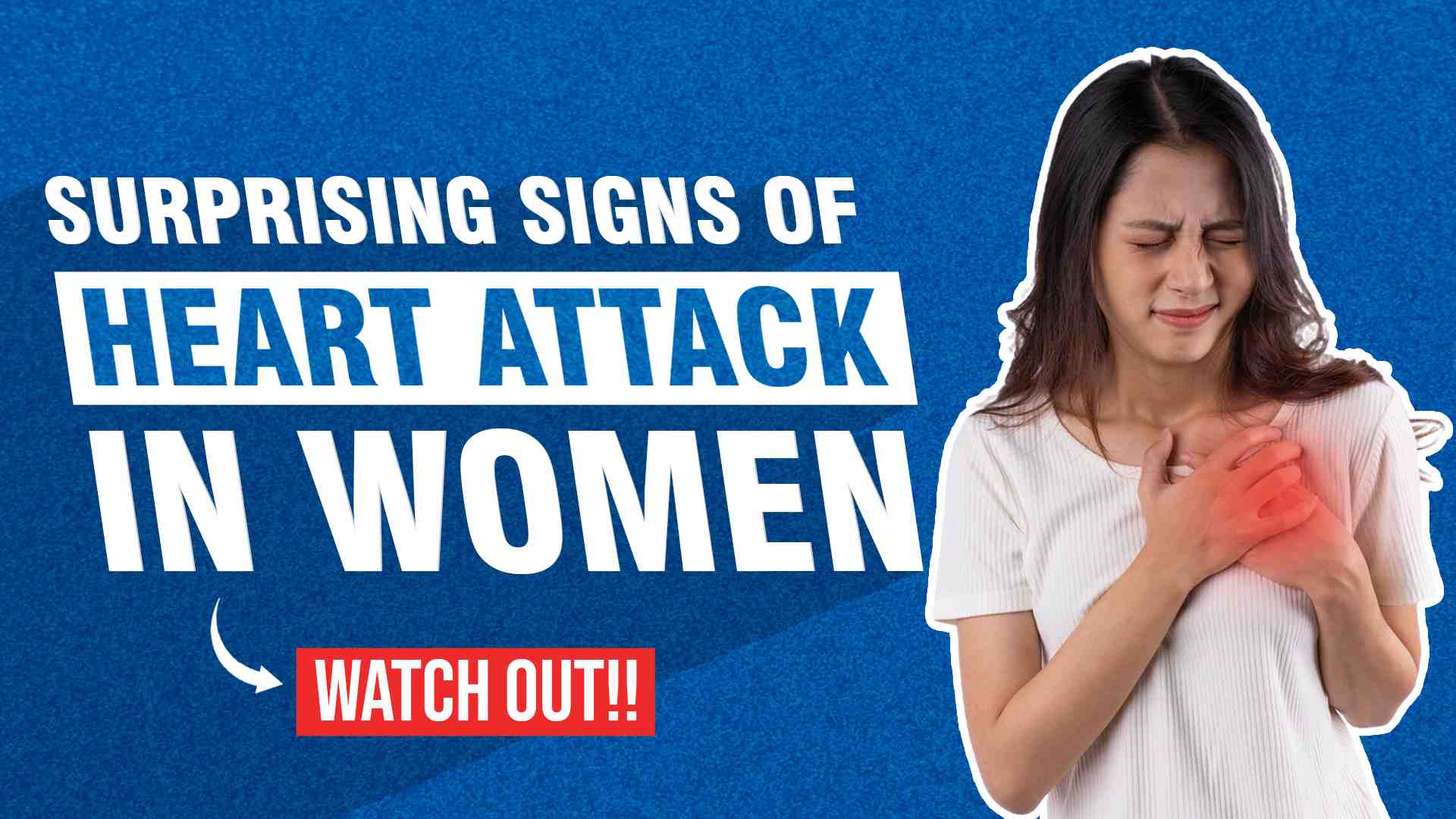Understanding Heart Failure Symptoms in Women: What to Watch Out For
Verified By Dr. Partha Prateem Choudhury | 26-Sep-2024
Heart disease has long been considered as a predominantly male situation; however it influences women notably. Unfortunately, the signs and symptoms of heart failure in ladies can often be non-specific and harder to recognize. Being aware of these signs and symptoms can save lives, as early detection and timely intervention can make a significant impact. In this article, we discover some important facts regarding heart failure signs in women, the variations in signs and symptoms among males and females, and the significance of recognizing them early. Dr. Partha Prateem Choudhury, Consultant Cardiologist at Kailash Hospital & Heart Institute, shares his expert insights on this critical issue.
Table of Content
Heart failure occurs when the heart is unable to pump blood effectively, resulting in insufficient delivery of oxygen and nutrients to the body's tissues. While heart failure can affect anyone, its symptoms can manifest differently in women compared to men. Understanding these differences is essential for early diagnosis and treatment.
"Many women do not realize that they are experiencing heart failure symptoms because they are often more subtle than in men," says Dr. Partha Prateem Choudhury. "It is vital that women should be made aware of these symptoms so may they seek medical advice if they suspect something is wrong."
Here are some of the most well-known signs of congestive heart failure in women. They should not be ignored because early diagnosis enhances better prognosis.
- Shortness of Breath: Fatigue and shortness of breath are the best-known and the first manifestations of heart failure among women. It may be experienced during exercise, or even while a person is at rest. According to Dr. Choudhury, shortness of breath, if it starts getting worse or happens more often may point to your heart not pumping the blood as it should.
- Fatigue and Weakness: Prolonged cough, chest discomfort, breathing problems, palpitations, and dizziness are other symptoms of heart failure. Quite a number of the women complain of extreme fatigue, even after simple activities. Simple activities like going up the stairs, walking or even going grocery shopping can trouble the patients. This is commonly overlooked as being part of strain, stress or even growing older while it may be an indication of possible heart failure. “Fatigue is common in women, but constant fatigue that interrupts the daily routine, should be investigated,” shares Dr. Choudhury.
- Swelling in the Legs, Ankles, and Feet (Edema): When the heart doesn't pump blood well, fluid can build up in the body. This can lead to swelling in the lower extremities, such as the legs, ankles, and feet. This is because the fluid is not being properly circulated by the heart and is instead collecting in these areas.
- Chest Pain or Discomfort: Chest pain or discomfort is a common sign of heart disease in women. It can feel like a sharp stab, a heavy pressure, or a dull tightness. Women often describe it as a feeling of fullness, squeezing, or discomfort instead of sharp pain. "Any form of chest pain or discomfort should be taken seriously, especially if it’s accompanied by other symptoms such as shortness of breath or fatigue," warns Dr. Choudhury.
- Heart Palpitations: Heart palpitations, or a speedy, fluttering heartbeat, are some common symptoms of heart failure in women. These palpitations may be brief, but they can indicate that the heart is struggling to maintain a regular rhythm.
Also read: Can a Blood Clot in Arteries Cause Heart Attack?
Heart failure and heart attacks are closely related, as untreated heart blockages can result in heart failure. The signs of coronary heart attacks in women can be exceptional from those in men and are frequently more subtle. Here are a few key symptoms of heart attack in ladies:
- Pain in the Jaw, Neck, or Back: While men often experience excessive chest pain in the course of a coronary heart attack, ladies may additionally feel ache in regions including the jaw, neck, or back. This discomfort may be slow and might come and go, making it harder to recognize as a sign of a heart attack.
- Nausea and Vomiting: Women are more likely than men to experience nausea, vomiting, or indigestion-like symptoms during a heart attack. This can often be confused with a stomach issue, delaying treatment.
- Dizziness or Lightheadedness: Feeling dizzy, lightheaded, or fainting can be a symptom of heart attack in women. This may occur suddenly and can be accompanied by shortness of breath or chest discomfort.
Understanding the differences in heart disease symptoms between men and women is crucial for timely diagnosis and treatment. While men often experience the classic symptom of intense chest pain, women’s symptoms can be more varied and less obvious.
"Women are more likely to experience symptoms such as shortness of breath, fatigue, and nausea, which can easily be attributed to other conditions," explains Dr. Partha Prateem Choudhury. "This makes it even more important for women to be vigilant about their heart health."
Several factors increase the risk of heart failure in women, including:
- High Blood Pressure: One of the leading causes of heart failure, high blood pressure often goes undiagnosed and untreated in women.
- Diabetes: Women with diabetes are at a higher risk of developing heart disease than men with diabetes.
- Obesity: Excess body weight can put additional strain on the heart, leading to heart failure.
- Smoking: Smoking increases the risk of heart failure in both men and women, but women who smoke are more likely to develop heart disease than men who smoke.
- Hormonal Changes: Post-menopausal women are at a higher risk for heart disease due to decreased levels of estrogen.
If you experience any of the heart failure symptoms listed above, it’s essential to see a healthcare professional as soon as possible. A cardiologist can help determine the underlying cause of your symptoms and develop a treatment plan to improve your heart health.
"If you’re experiencing symptoms such as shortness of breath, chest pain, or fatigue, don’t hesitate to seek medical attention. Early intervention can make a big difference in managing heart disease," advises Dr. Choudhury.
Dr. Partha Prateem Choudhury, Consultant Cardiologist at Kailash Hospital & Heart Institute, specializes in diagnosing and treating cardiovascular diseases. The hospital is one of the best heart hospitals in Noida, offering advanced cardiac care and comprehensive heart failure treatment options.
Heart failure symptoms in women can often be subtle and easily overlooked, but recognizing these signs early can significantly impact the effectiveness of treatment. Symptoms like shortness of breath, fatigue, chest discomfort, and swelling should never be ignored, especially if they persist or worsen over time.
"Women should be proactive about their heart health and aware of the unique symptoms they may experience," concludes Dr. Partha Prateem Choudhury. "Regular check-ups with a cardiologist and a heart-healthy lifestyle are the best ways to prevent and manage heart failure."
If you or someone you know is experiencing any of the symptoms of heart failure or heart attacks in women, it’s essential to seek medical advice promptly. Kailash Hospital & Heart Institute in Noida offers specialized cardiac care to help diagnose, treat, and manage heart disease in women, ensuring the best possible outcomes.



 +91-9711918451
+91-9711918451
 international.marketing@kailashhealthcare.com
international.marketing@kailashhealthcare.com







